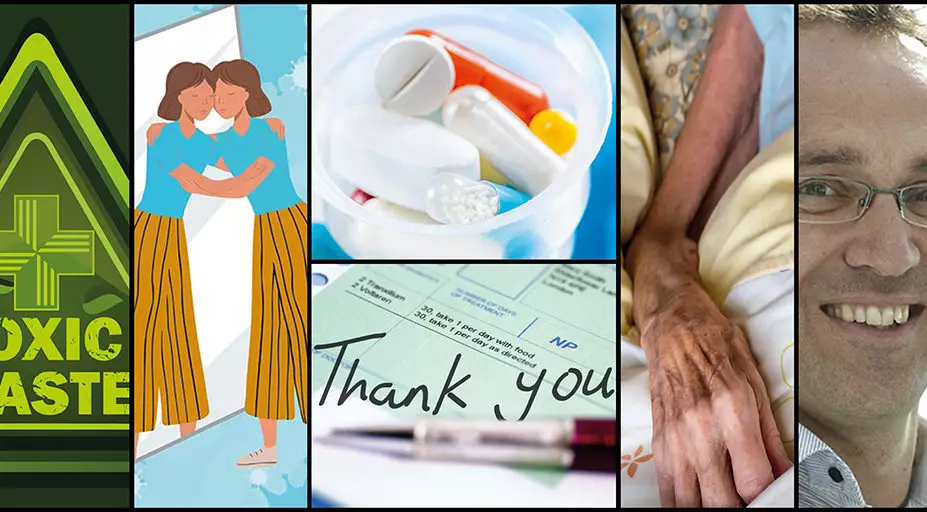
The Pharmaceutical Journal‘s opinion section features a wide range of comment pieces, including analysis from experts in all areas of science and medicine, powerful personal stories of people doing great things in pharmacy and Q&As with interesting people in pharmacy.
The most-read opinion article was a blog written by pharmacy manager Pauline Jablonski, who describes how she contracted COVID-19 twice and how she realised she needed to be kind to herself as she learned how to live with the symptoms of long COVID. She provides a compelling insight into how the pandemic has personally affected so many people in the pharmacy profession.
Other popular opinion pieces included a critical look at the use of antibiotics during the COVID-19 pandemic and a review of the evidence behind the approval of a new treatment option to prevent cardiovascular disease. Also in the top five most read articles, we had the story of a pioneering GP pharmacist helping to reduce overprescribing of opioids in her practice.
We want to thank everyone that has submitted articles to The Pharmaceutical Journal in 2021 — we could not do it without you. Here is a selection of the most popular opinion pieces this year.
1. ‘Getting COVID-19 twice: the long road to recovery‘ — Pauline Jablonski
A powerful story chronicling how one pharmacist has struggled to get back to normal life after developing long-COVID.
2. ‘Bacterial co-infection is unusual in non-critical COVID-19 cases, so we must reduce our antibiotic prescribing’ — R Andrew Seaton
Although rarely indicated for COVID-19, antibiotic prescribing has been high globally and in Scotland during the pandemic. This opinion piece from a consultant in infectious diseases is a timely reminder that antimicrobial resistance has not gone away and stewardship principles must not be forgotten even during a pandemic.
3. ‘Conflicting regulations on controlled drugs may expose pharmacists to criminal liability — the law must change‘ — Cathal Thomas Gallagher
A legal expert outlines why contradictions in misuse of drugs regulations could mean there are ways in which pharmacists dispensing controlled drugs could be seen to be breaking the law, and argues that two decades after their last revision, these regulations are surely due a rethink.
4. ‘Inclisiran: a new option for cardiovascular disease but not yet a ‘game changer’‘ — Rani Khatib and Dermot Neely
This article gives an insight into the limitations of draft guidance from the National Institute for Health and Care Excellence that recommends the cholesterol-lowering drug inclisiran in selected high-risk individuals. It argues that there are several hurdles to get over before prescribers can be confident about its role in preventing heart attacks and strokes.
5. ‘How I reduced opioid prescribing in my GP practice by more than 450,000mme in less than a year‘ — Deborah Hollywood
An inspiring story of how this enterprising GP pharmacist created a pathway designed to review the opioid doses for patients at her practice, with which she has achieved great success.
6. ‘Apixaban use in low body weights — should we be monitoring anti-Xa levels?‘ — Patrick Mok, Sarah Stephenson and Syed Zafar
These specialists argue that even though there are limited data for the use of direct oral anticoagulants in low body weight, it does not mean that dosing cannot be adjusted in hospital to ensure patients are not put at risk from over-anticoagulation.
7. ‘Chemotherapy is harming the environment: it is time for regulators, manufacturers and pharmacy to take action‘ — Andrew Walker and Suhani Ghiya
Part of our #PJgreenpharmacy series, this comment piece looks at how treatments for cancer harm the environment and worsen climate change, and calls for pharmacists to practice more sustainably.
8. ‘Hospital insulin errors remain high, but we can improve the safety of inpatients with diabetes‘ — Amie Bain
Insulin prescribing errors are unacceptable but entirely avoidable, hindered by variation across NHS trusts in terms of both prescribing systems and interventions used to support insulin prescribing, argues this pharmacist.
9. Steve Tomlin: ‘If two-year-olds can swallow a piece of Lego, they can swallow tablets’ — Nigel Praities
We speak with Great Ormond Street Hospital’s chief pharmacist about the management of paediatric patients, using 3D printing and how the COVID-19 pandemic has affected his team.
10. ‘As a pharmacist-turned-GP, I’m pleased to see pharmacists finally getting the recognition they deserve‘ — Mohammad Ali
A sessional GP and former pharmacist gives their unique perspective on the value of pharmacists in general practice and how it is now difficult to imagine life without them.
You may also be interested in

Top ten features of 2025

Learning and CPD: 2025 in review
